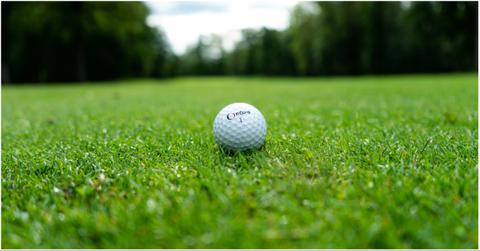What Does "E" Mean in Golf? What It Means When a Player’s Score Says "E"
What does it mean when someone scores an "E" while golfing?
Published April 11 2025, 12:46 p.m. ET

If you’ve ever flipped on a golf tournament and found yourself staring at a scoreboard that looks more like a math test than a sports update, you’re not alone. One of the most common questions for new viewers is simple but surprisingly confusing: What does “E” mean in golf?
Whether you're watching Masters, scrolling past a PGA update, or just trying to impress someone with your golf knowledge, you've probably seen that mysterious single letter — E — next to a player’s name and had a few questions. Is it good? Bad? Is it some sort of grade?
Keep reading as we explore what an “E” really means in the game of golf.

What does “E” mean in golfing? It has to do with the scoring system.
Let’s start with the basics. Golf doesn’t use the kind of scoring system you’ll see in football or basketball. In golf, the goal is to finish a round (or an entire tournament) using the fewest number of strokes possible. Instead of showing the total number of strokes right on the leaderboard, scores are displayed relative to par.
So, what’s par? It’s the number of strokes an expert golfer is expected to take to complete a hole or a course. For example, if a hole is a “par 4,” that means a golfer is expected to take four shots to get the ball in the hole.
When you add up all 18 holes, most professional courses are “par 70,” “par 71,” or “par 72” in total. Now, this is where the “E” comes into the picture.
When a golfer has completed a round — or several rounds — and their score is exactly equal to par, they’re said to be “even par.” Instead of writing “0” on the scoreboard, tournament officials use the letter “E.”
So, "E" stands for even par. It means the golfer is playing exactly as expected, no better, no worse. They’re holding steady, which, in a high-stakes tournament, can be a pretty solid place to be.
Why don’t they just put “0” on the scoreboards instead?
OK, so why not just write “0” instead of “E”? It’s a fair question. The reason is partly visual and partly traditional. In golf, positive and negative numbers are common. A golfer who is doing well might be “-5” (five under par), while someone struggling might be “+3” (three over par). A big old “0” in the middle of those numbers can look odd, and it doesn’t reflect the status of being exactly on par. Using “E” makes it easier to scan the leaderboard quickly and clearly.
More importantly, seeing “E” gives you context. It’s not zero in the boring math sense — it’s even. It means the golfer has matched expectations for that round or tournament. In professional golf, where even a single stroke can separate the winner from everyone else, staying at E can mean you’re just a birdie away from the top of the leaderboard.
So, does this mean an “E” is a good thing to have on a scoreboard?
Now, here’s where things get a bit weird, and everything you know about scoring related to sports goes out the window. “Good” is a relative term. For a casual golfer, getting a score that amounts to “as expected” might feel great. For a professional golfer, however, “E” is a solid score. It, however, isn’t spectacular.
An “E” score means the player isn’t losing ground, but they’re also not gaining on the leaders if others are scoring under par. In a close tournament, a golfer at “E” might be right in the mix — especially on tough courses where even par is hard to reach.

To sum it up, the “E” in golf stands for “even par.” It means the player is playing “as expected.” Unfortunately, an “even par” game isn’t usually going to be enough for a professional golfer to take home the gold at the end of a tournament.